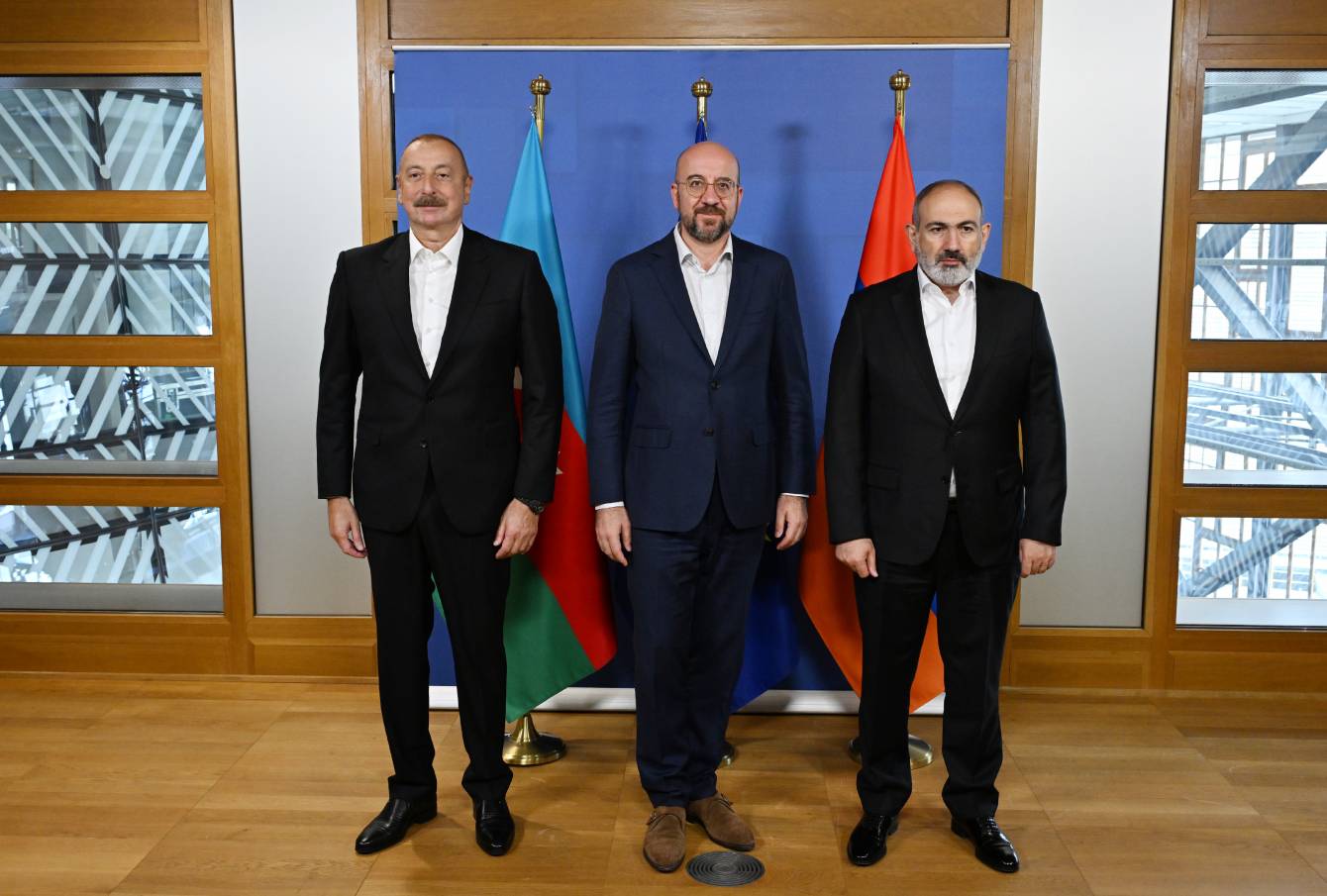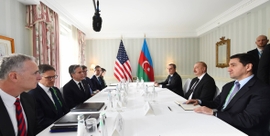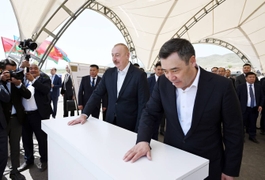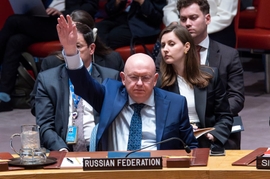Negotiations on the normalization of relations between Azerbaijan and Armenia continued last week in Brussels in a meeting between leaders of both countries, hosted by European Council President Charles Michel.
The 6th Trilateral Meeting on July 15 focused on the key issues pertaining to the Azerbaijan-Armenia peace agenda.
Views were exchanged on the delimitation of borders, opening of transport communications, withdrawal of Armenian military units from the territories of Azerbaijan, and disarmament of illegal military detachments in addition to the normalization and peace efforts, Azerbaijan President’s press service reported.
Michel called the discussions “one of the most comprehensive and vigorous stages of negotiations between Armenia and Azerbaijan”, which was the latest in a series of intensive and productive high-level meetings involving Armenia and Azerbaijan leaders, Deputy Prime Ministers and Foreign Ministers since early May, in Brussels, Chișinău, Washington, Moscow and on the bilateral border.
“The Armenian and Azerbaijani leaders once again fully reconfirmed their respect for the other country’s territorial integrity and sovereignty. Based on the understanding that Armenia’s territory covers 29.800 km2 and Azerbaijan’s 86.600 km2,” Michel said in a post-meeting statement.
The territorial integrity issue between Baku and Yerevan was reportedly solved during the meetings in Prague (Czech Republic) and Sochi (Russia) in October 2022. Back then, Armenian Prime Minister Nikol Pashinyan officially recognized the sovereignty of Azerbaijan on its internationally recognized territories, including the Karabakh region.
In one of his recent speeches, Azerbaijan President Ilham Aliyev noted that the positive aspects observed recently is some progress in the position of the Armenian side.
However, the ongoing calls by Yerevan for the so-called “rights and securities” of Armenians living in the Karabakh region hinder the peace process. Baku says it is not going to discuss this issue with any external actor since it is an internal matter.
Michel noted that the European Union encourages a direct dialogue between Baku and representatives of Armenians living in the Karabakh region.
Regarding the border delimitation, Michel said President Aliyev and Prime Minister Pashinyan have agreed to intensify and accelerate the work of the bilateral commissions leading the respective process.
On connectivity, discussions focused on modalities of future transport arrangements that will adhere to principles of sovereignty, jurisdiction, and reciprocity.
“The construction of the railway connection should be undertaken forthwith. The EU would be ready to contribute financially,” Michel said, referring to Article 9 of the Trilateral Statement of November 10, 2020, signed by Azerbaijan and Armenia, which calls for the construction of a new transport communication linking the western regions of Azerbaijan with its southwestern Nakhchivan exclave, i.e. the Zangazur Corridor.
The multimodal corridor is expected to come online in 2024. It will enable a direct connection with Nakhchivan following decades of isolation due to the Armenian occupation of Azerbaijani lands from 1991-2020.
Meanwhile, Michel also welcomed the resumption of the movement of the International Committee of the Red Cross (ICRC) convoys through the Lachin border checkpoint of Azerbaijan, as well as highlighted Baku’s willingness to ensure humanitarian supplies to the Karabakh region via the Aghdam district.
Azerbaijan installed a border checkpoint at the entrance of the Lachin road in April of this year in response to illegal shipment, including arms and ammunition, by the Armenian separatists. The operation of the control point was obstructed periodically due to the Armenian side’s provocations.
The checkpoint was closed on July 11 after Azerbaijan customs employees reported smuggling attempts to the Karabakh region in ICRC vehicles. For investigation purposes, the checkpoint remained out of operation for three days and returned online on July 14. Currently, the transfer of Armenian patients from Azerbaijan's Karabakh region to Armenia is ensured without hindrance.
Following the dissolution of the Soviet Union in 1991, Armenia launched a full-scale military campaign against Azerbaijan, resulting in the longest and deadliest war in the South Caucasus region. The war ended in a ceasefire in 1994, with Armenia forcibly occupying 20 percent of Azerbaijan’s internationally recognized territories. This occupation led to the deaths of over 30,000 Azerbaijanis and the expulsion of one million others in a brutal ethnic cleansing campaign conducted by Armenia.
On September 27, 2020, the conflict between Azerbaijan and Armenia escalated when Armenian forces in the occupied Azerbaijani lands shelled military positions and civilian settlements of Azerbaijan. In a counter-attack that lasted 44 days, Azerbaijani forces liberated over 300 settlements, including the cities of Jabrayil, Fuzuli, Zangilan, Gubadli, and Shusha, effectively ending the nearly 30-year-long illegal Armenian occupation. The war concluded with a tripartite statement signed by Armenia, Azerbaijan, and Russia on November 10, 2020. Under this statement, Armenia also returned the occupied districts of Aghdam, Kalbajar, and Lachin to Azerbaijan.
Following Azerbaijan’s victory in the 2020 war, delimitation issues emerged along the Armenia-Azerbaijan state border. Azerbaijan regained control over a significant portion of the border, leading to the deployment of units from the Armed Forces and State Border Service in border regions, including Kalbajar and Lachin, to strengthen border protection.







 President Ilham Aliyev shed light on the evolving contours of the peace process with Armenia during an international conference in Baku this week. ...
President Ilham Aliyev shed light on the evolving contours of the peace process with Armenia during an international conference in Baku this week. ...
 Iranian President Ebrahim Raisi expressed Tehran’s readiness to participate in significant development projects in Sri Lanka during the inauguratio...
Iranian President Ebrahim Raisi expressed Tehran’s readiness to participate in significant development projects in Sri Lanka during the inauguratio...
 Turkmen President Serdar Berdimuhamedow and British Secretary of State for Foreign Affairs, Commonwealth Affairs, and Development David Cameron dis...
Turkmen President Serdar Berdimuhamedow and British Secretary of State for Foreign Affairs, Commonwealth Affairs, and Development David Cameron dis...



